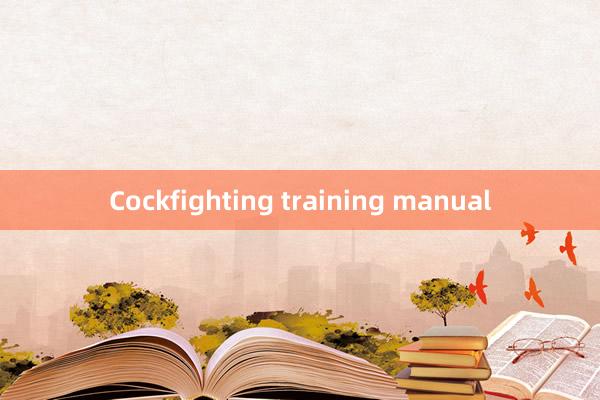
Cockfighting is a centuries-old tradition that has been practiced in various cultures around the world. While it is banned in many countries due to ethical concerns, it remains legal and popular in some regions. For those who legally participate, understanding the basics of training and preparing gamecocks is essential. This manual provides a detailed guide on how to train roosters for cockfighting, ensuring that they are in peak physical condition and mentally prepared for the fight.
Before diving into the training process, it’s important to understand the natural instincts of gamecocks. These birds are naturally territorial and aggressive, traits that are essential for success in cockfighting. They have sharp instincts, quick reflexes, and a strong desire to dominate other males. Breeding plays a crucial role in this, as only roosters with proven fighting capabilities should be bred for the purpose of cockfighting.
When selecting a gamecock for training, it’s important to choose birds that are healthy, strong, and show signs of aggression. Birds that are too passive or weak will not perform well in the ring.
Physical conditioning is the foundation of any successful cockfighting training program. A well-conditioned gamecock will have the stamina, speed, and strength needed to outlast and overpower its opponent. The following are key aspects of the physical conditioning process:
Exercise Regimen: Gamecocks need regular exercise to build muscle,win79 improve stamina, Unlocking the Future with 10 Jilicc_ A Revolution in Innovation and maintain flexibility. Daily exercise should include running, PH365 Bet_ Your Gateway to Unmatched Sports Betting and Online Gaming Experience jumping, 50phginto and sparring. Sparring with other roosters in controlled settings helps build their fighting instincts and quickens their reaction times.
Wing and Leg Strength: Strong wings and legs are critical in cockfighting, as they provide the bird with the power to strike and evade attacks. One common method of strengthening these areas is to use weight training. Attaching small weights to the legs or wings during exercise helps increase muscle mass and endurance. This method should be used with caution to avoid injury.
Rest and Recovery: Overtraining can lead to exhaustion and injury. Gamecocks need proper rest between training sessions to ensure that they recover fully. A balance of intense physical training and rest is key to keeping them in top fighting condition.
Diet: Proper nutrition is essential for building muscle and ensuring the bird has the energy needed for training and fighting. A high-protein diet is often recommended, including grains, seeds, and specially formulated supplements for game birds. Fresh water should be available at all times.
In addition to physical conditioning, mental preparation is equally important. A gamecock that is mentally sharp will be more focused and responsive in the ring. The following strategies can help sharpen a bird’s mental readiness:
Familiarization with the Ring: Gamecocks should be regularly introduced to the fighting ring, so they become comfortable with the environment. This helps reduce anxiety or confusion on the day of the fight.
Sparring Sessions: Controlled sparring sessions with other roosters are vital for honing a bird’s fighting instincts. These sparring matches should be closely monitored to ensure that no injuries occur. The goal is not to harm the birds but to improve their fighting skills and reaction times.
Exposure to Noise and Crowds: Cockfights often occur in noisy and crowded environments. It’s important to expose gamecocks to such conditions during training so they can remain focused and undistracted during an actual fight.
Keeping gamecocks healthy is essential throughout the training process. Regular health checks should be conducted to ensure the bird is free from illness or injury. Some key health practices include:
Vaccination: Gamecocks are prone to various diseases, especially in regions where cockfighting is common. Vaccinations should be given to protect them from common poultry diseases.
Parasite Control: Internal and external parasites can weaken gamecocks, affecting their performance. Regular treatments for parasites, such as deworming and mite control, are necessary to keep the birds in peak condition.
Injury Care: Cockfights can result in injuries such as cuts, bruises, or broken bones. Immediate care should be given to any injuries sustained during sparring or fights. Keeping a well-stocked first-aid kit specifically for game birds is highly recommended.
In the days leading up to a fight, it’s important to taper down the training intensity to allow the gamecock to fully recover and build up energy reserves. During this time, diet should be closely monitored to ensure the bird is at its peak physical condition without gaining excess weight. Sparring should be reduced, and the gamecock should be allowed to rest.
Additionally, gamecocks should be groomed before a fight. This includes trimming their feathers for better aerodynamics and checking their beaks and spurs to ensure they are sharp and ready for combat. Some trainers also fit artificial spurs to give their birds an added advantage in the ring.
Training a gamecock for cockfighting requires a combination of physical conditioning, mental preparation, and proper care. While cockfighting is controversial and illegal in many places, for those who participate in areas where it remains legal, it’s important to ensure that the birds are treated with respect and trained properly. The goal of training is to bring out the bird’s natural fighting instincts and abilities, helping it perform at its best in the ring. By following this manual, trainers can prepare their gamecocks to compete effectively and safely.
Jili casinowww.claytonforschoolboard.com